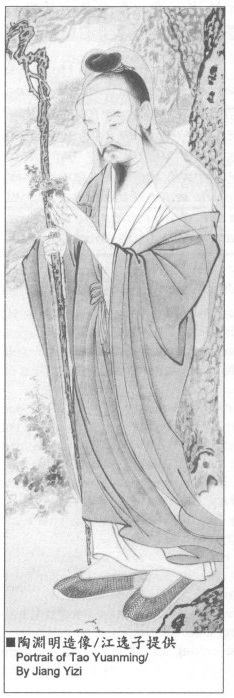|
今天講的這個是陶淵明。陶淵明可以叫陶酒明,又可以叫陶酒鬼,因為他一看見酒就什麼都忘了,只知道喝酒;喝完了酒,又寫文章、作詩。若沒有酒,他就犯了癮了,就像抽鴉片煙的人,沒有鴉片煙就犯了瘾了,他這沒有酒也就犯了酒癮。足見這個人對於酒是離不開的,所以他不離手,手不離杯,可以說是一個明教中的愚痴的人,什麼他都明白了,可是對於酒他看不開、放不下。
「名潛字淵明」:這個人他的名字叫潛,潛就是潛伏起來了。好像那個潛水艇潛到水裡,那麼他也是好像魚潛到水裡似的。所以名字就叫淵明,就是很深的地方,可是很深的地方他也明白。他這個名字取得也很特別的。
「東晉江西潯陽人。陶侃曾孫」:他是東晉時候江西潯陽的人。「一生愛菊」:他這個人,這一生之中就喜愛菊花。因為什麼他愛菊花呢?你們又要懂得這一點,因為菊花能造酒,古來人就是喝菊花酒。那麼因為他喝的酒,其中一定也有菊花,所以他很歡喜養這個菊花來造酒,用酒泡菊花喝,所以喝得醉了就睡,醒了又喝,這麼樣子!
「好讀書」:那他造酒,他可是好讀書,讀什麼書呢?古人讀書讀得明白怎麼樣造酒。他一讀起書來,那麼又喝酒,一邊喝酒一邊讀書,你們覺得很好?「志清高。不羨名利」;他的志向也很清高的,不羨慕名利,因為他不羨慕名利,所以在幼年時候,他也做過軍人。「後為彭澤令」:做過軍人之後,又被委派做這個彭澤令。
他門前種了五棵柳樹,所以他又自號為「五柳先生」。那麼他的一生,沒有什麼毛病,只有這一個喝酒的毛病。「詩有『採菊東籬下。悠然見南山』佳句」:他作的詩,作的文章很多,其中有一首詩,他就說他造了一個小房子,在沒有人到的地方,沒有車馬這種喧鬧,自己種點菊花,出去遊山玩水。所以他就說「採菊東籬下,悠然見南山」,這是一種欣賞大自然的境界的詞句。他這個詩裡頭有這麼兩句,這是很好的一個句子。
「恥同流合污。為官八十日」:他做彭澤令時,因為有貪官污吏到那兒去查他這個縣政怎麼樣,可是去查的時候,他就先要你送點禮,那麼這一個查他的官,這個視察員才能給他說一點好話,上奏到皇帝;如果不送禮,就那兒說他一些壞話。這個視察員大約是在灶君爺那兒畢業,所以你不用糖把他嘴給沾上,他就上天什麼都說,等回來也什麼都管;若把他嘴給用糖粘上,叫他上天演好事,下界降吉祥,那麼他大約就不會說這個壞話了。 這一位喝酒的先生──酒先生,他因為捨不得給送禮的錢,為什麼捨不得?他說:「我有錢,我還買酒喝呢!我送禮給你,我多冤枉。」因為這個,那麼他就沒有升官的機會。「辭官歸里。曾云:『不為五斗米折腰』」:沒有升官機會,他就說:「哎!我不為五斗米折腰啦!」就辭官不做了。 →待續
|
|
 Today we will talk about Tao Yuanming. Tao Yuanming could also be called Tao Jiuming ("Jiu" means wine) or Tao Jiugui ("Jiugui" means drunkard), because whenever he saw wine, he would forget about everything except drinking the wine. After he finished it, he would write essays and poems. If he didn't have any wine, he would develop a craving for it, just as opium smokers crave opium when they don't have any opium. His craving was for wine. This goes to show that he and wine were inseparable. His glass never left his hand, and his hand never let go of his glass. He could be called a fool among the wise. He understood everything, but he could not see through and renounce his attachment to wine. Today we will talk about Tao Yuanming. Tao Yuanming could also be called Tao Jiuming ("Jiu" means wine) or Tao Jiugui ("Jiugui" means drunkard), because whenever he saw wine, he would forget about everything except drinking the wine. After he finished it, he would write essays and poems. If he didn't have any wine, he would develop a craving for it, just as opium smokers crave opium when they don't have any opium. His craving was for wine. This goes to show that he and wine were inseparable. His glass never left his hand, and his hand never let go of his glass. He could be called a fool among the wise. He understood everything, but he could not see through and renounce his attachment to wine.
His name was Qian and his other name was Yuanming. He was named Qian, which means "concealed" or "lying underwater." Submarines, for instance, stay hidden underwater. He was like a fish lying hidden in the water. Therefore, his other name was Yuanming. Yuan means an abyss, a very deep place. Even in deep places, he was able to understand. His name is very distinctive.
Born in Xunyang of Jiangxi in the Eastern Jin Dynasty, he was the great-grandson of Tao Kan. He was a native of Xunyang of Jiangxi Province during the Eastern Jin Dynasty. He had a life-long love for chrysanthemums. Throughout his life, he cherished a fondness for chrysanthemums. Why was this? You should be aware of the reason. It was because chrysanthemums can be used to make wine. In ancient times, people drank chrysanthemum wine. The wine that Tao Yuanming drank must have had chrysanthemums in it; that's why he liked to grow chrysanthemums to make wine. He soaked the chrysanthemums in wine, then drank it until he became drunk. He would then doze off, and when he awakened, he would drink again. That's how he was!
He was fond of study. Although he made wine, he also liked to study. What did he study? This person of the past studied to the point that he understood how to make wine. When he studied, he also drank wine. On the one hand he drank wine, and on the other, he studied. You all think that's pretty nice, don't you? His aspirations were pure and noble, and he had no desire for fame or profit. His ideals were very lofty, and he did not covet name and gain. Because he didn't covet name and gain, he served in the military when he was young. Afterwards, he became a district magistrate in Peng Ze. After serving in the military, he was appointed as the magistrate of Peng Ze.
He planted five willow trees by his front door and nicknamed himself Mr. Five Willows. Throughout his life, he didn't have any vices, except for one: he liked to drink. His poetry includes the excellent verse: “Picking chrysanthemums by the eastern fence, I see the southern mountains in the distance." He wrote many poems and essays. In one poem, he speaks of building a hut in a place removed from people and the noise of traffic. There, he planted some chrysanthemums and roamed about enjoying the scenes of Nature. Thus he wrote, "Picking chrysanthemums by the eastern fence, I see the southern mountains in the distance." This verse describes the state of enjoying Nature. It is an excellent verse from one of his poems.
Disdaining to comply with corrupt trends, he was an official for only eighty days. When he was serving as district magistrate for Peng Ze, he was visited by corrupt officials whose job was to inspect his district. When inspectors came to visit, it was customary to bribe them with some gifts so that they would put in some good words and submit a favorable report to the Emperor. If one did not give them any gifts, they would make a critical report. Those inspectors probably graduated from the school of the Kitchen God, so if you didn't seal their lips with sweets, they would go to the heavens and say all sorts of things, and when they returned, they would want to supervise everything. If you sealed their lips shut with some candy, telling them do report the good things in heaven and bring good luck to the world, they would probably refrain from saying bad things. Because he was a man who liked to drink wine, "Mr. Wine," he couldn't bear to use his money to buy gifts for the inspectors. Why not? He thought, "If I had any money, I'd buy some wine to drink. If I gave them gifts, I'd be taking a big loss." Because of this, he lost the opportunity to be promoted. He resigned his post and returned to the countryside. He said, "I will not bow for the sake of five pecks of rice." Since he had no opportunity for promotion, he said, "Ah! I'm not going to bow for five pecks of rice anymore! Then he resigned from his post. →To be continued
|